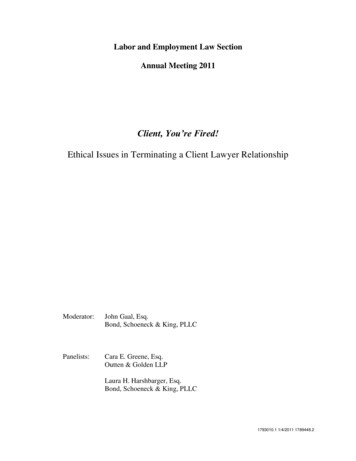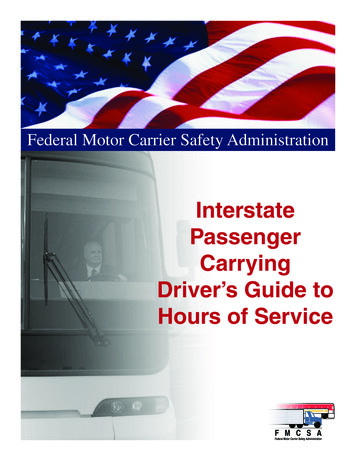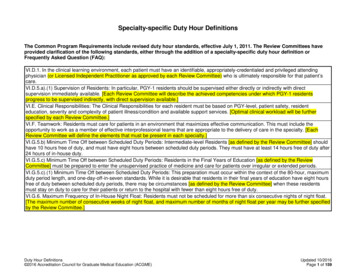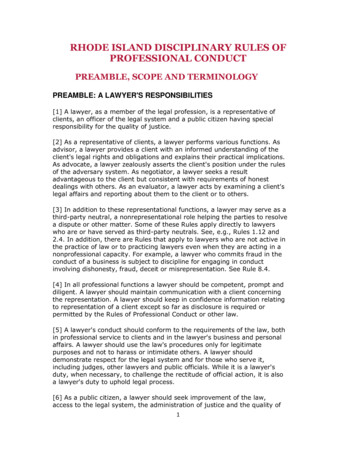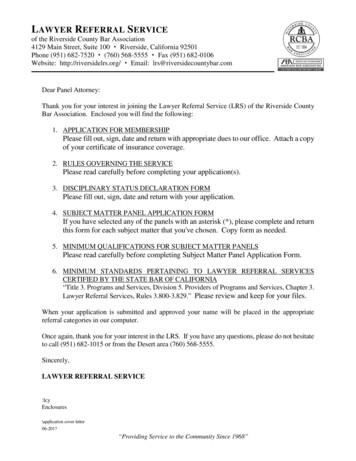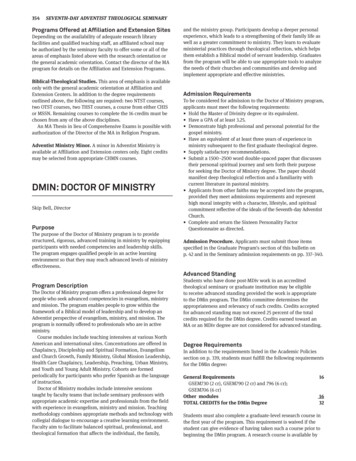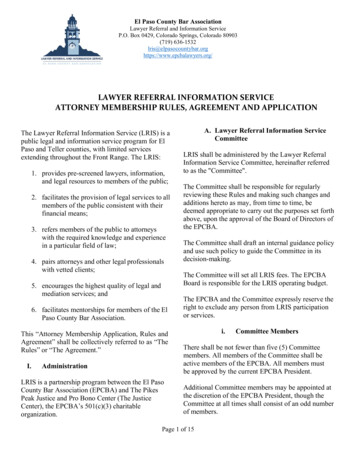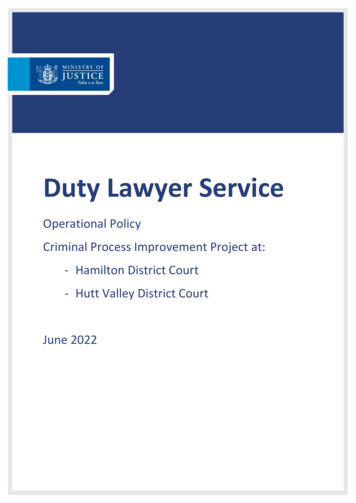
Transcription
Duty Lawyer ServiceOperational PolicyCriminal Process Improvement Project at:- Hamilton District Court- Hutt Valley District CourtJune 2022
Although all reasonable steps have been taken to ensure the accuracy of the information contained in this document, theMinistry of Justice disclaims any and all responsibility for any inaccuracy, error, omission, or any other kind of inadequacy,deficiency, or flaw in, or in relation to, the information; and fully excludes any and all liability of any kind to any person orentity that chooses to rely upon the information.Published by the Ministry of Justice2021 Crown CopyrightMinistry of JusticeThe Justice Centre, 19 Aitken StreetDX SX10088, Wellington, New ZealandT 64 4 918 8800F 64 4 918 8820E lsc@justice.govt.nzW www.justice.govt.nz
Message from the Legal Services CommissionerThe Criminal Process Improvement Project (CPIP) is a cross sector programme working tomake every court appearance meaningful and reduce the time cases take to reach aresolution. It was initiated to work on reducing backlog and work pressure in the criminaldistrict court. Legal Aid Services is committed to supporting this important initiative.The Discovery Phase of CPIP found that appearances that don’t result in meaningfulprogress for bail matters or in the admin stage result in increased average events per case,matters proceeding to the review stage that could have been resolved in the admin stageand matters progressing to a further sentencing date when they could have been sentencedon the day a plea was entered.Expanding the scope of the duty lawyer service has been identified as one potential solutionthat can reduce unnecessary events and delays.The present duty lawyer operational policy provides that duty lawyers advise unrepresenteddefendants at their first court appearance. The policy prevents duty lawyers from advancingbail applications in many cases where bail is opposed. Where appropriate, it does providefor duty lawyers to assist defendants to enter a plea and potentially resolve their matter onthe same day.However, there are many reasons why, for other than minor matters, duty lawyers do nottypically progress matters to the entering of a plea or give advice to defendants on same daysentencing.This policy for the CPIP pilot at Hamilton and Hutt Valley District Courts:1. enables duty lawyers to advance bail applications2. encourages duty lawyers to progress or advance matters where appropriate toentering a plea and/or for sentencing.The success of these proposals is also dependent on other CPIP proposals that will supportduty lawyers to advance matters. For example, for the Police to provide more disclosure atan earlier stage and a second prosecutor who can be available to discuss matters before ahearing, and the availability from Corrections staff of stand-down (same day) probationreports.
ContentsMessage from the Legal Services CommissionerDuty lawyer serviceIntroduction344Appointment as a duty lawyer4Contract for the Provision of Specified Legal Services5Authority for the service5Glossary5Responsibilities of duty lawyers5Taking instructions6Applications for criminal legal aid7Attendance requirements8Supervision of the duty lawyer service9Payment10Travel time and mileage11Accommodation11Duty Lawyer Roster12Removal from the duty lawyer roster12Appendix 1 – Instructions on bail matters for duty lawyers in all district courts 13Appendix 2 – Payment rates15Appendix 3: Duty Lawyer Instructions16Appendix 4: Performance Monitoring Process17iii
Duty lawyer serviceIntroduction1. This policy describes the operation of the duty lawyer service.2. The object of the duty lawyer service is to ensure that a sufficient number of lawyers areavailable at each District Court for the purpose of assisting, advising, and representingunrepresented defendants charged with a criminal offence and where appropriate, resolving orprogressing their matter.3. The Secretary for Justice is responsible for the duty lawyer service and specifying therequirements of the role. The Legal Services Commissioner is responsible the administration ofthe service.4. Administration of the duty lawyer service at Hamilton and Hutt Valley District Courts isdelegated to the Initial Criminal Legal Services (ICLS) Unit at the Manukau PDS.5. This administration is undertaken with the aim of helping to ensure the criminal district courtsrun efficiently and effectively.6. Court-specific duty lawyer instructions cover administrative aspects of the duty lawyer service.The instructions include matters such as: the role of the PDS duty lawyer supervisor specific hours of work arrangements when duty lawyers are unable to attend as rostered Saturday and public holiday roster arrangements the wearing of duty lawyer badges.7. The duty lawyer instructions can be found on the Ministry’s website in information for dutylawyers. If there is any conflict between the duty lawyer instructions and this policy, this policyprevails.8. Information on the duty lawyer approval criteria can be found in the schedule to the LegalServices (Quality Assurance) Regulations 2011. Lawyers seeking duty lawyer approval to provideduty lawyer services should contact the Legal Aid Provider Services team by email atlegalaidprovider@justice.govt.nz.Appointment as a duty lawyer9. Approval as a duty lawyer does not guarantee a place on a court roster. Duty lawyers seekingadmission to a roster must register their interest with ICLS who will provide information onroster admission. ICLS is based at the Manukau PDS, email duty.lawyer@justice.govt.nz.October 20214
Contract for the Provision of Specified Legal Services10. A duty lawyer may only be appointed to a roster if they have a current contract to provideSpecified Legal Services.Authority for the serviceThe duty lawyer service operates under the authority of the Secretary for Justice as a specified legalservice pursuant to s68(2)(b) of the Legal Services Act 2011.Glossary11. In this document, unless the context requires otherwise: ‘Duty lawyer service’ means the specified legal service to provide lawyers to unrepresenteddefendants established under s68(2)(b) of the 2011 Act ‘ICLS Unit’ means the Initial Criminal Legal Services Unit ‘PDS’ means the Public Defence Service ‘Roster’ means a list, maintained by the Secretary, of duty lawyers approved to provide theduty lawyer service in a particular location and who have applied for and been granted aplace on the list for the purpose of scheduling and allocating the duty lawyer service ‘Rostered duty’ means the period on a specified date that the duty lawyer is scheduled to beavailable to provide duty lawyer services and in respect of which the duty lawyer has notnotified the PDS duty lawyer supervisor that he or she is unavailable or arranged areplacement ‘Secretary’ means the Secretary for Justice ‘PDS duty lawyer supervisor’, means a duty lawyer who has been designated with additionalresponsibilities to ensure effective operation of the duty lawyer service in that court.Responsibilities of duty lawyers12. Duty lawyers are required to provide services to unrepresented defendants in accordance withthe following broad guidance. They deal with: matters where the defendant wishes to be represented by the duty lawyer, intends to entera guilty plea and it can be entered on the day and/or a legal aid application is not required matters where the defendant wishes to be represented by the duty lawyer at theirsentencing and it can be dealt with or remanded to the next court event on the day and alegal aid application is not required matters where the defendant wishes to be represented by the duty lawyer, intends to entera not guilty plea and the matter can be dealt with or remanded to the next court event onthe day and/or a legal aid application is not required matters where the defendant wishes to seek a remand without plea to make a legal aidapplication interim name and case detail suppression ordersbail matters in accordance with the instructions in Appendix 1.13. The responsibilities of duty lawyers dealing with the above matters include: obtaining information from the Court and the prosecutionOctober 20215
explaining the nature and seriousness of a charge advising the defendant whether they may have a defence to a charge providing information about the range of sentences that the court may impose for a charge advising unrepresented defendants about plea, the possibility of a remand without plea, andthe right to elect to be tried by a jury explaining what happens after a defendant pleads guilty/not guilty to a charge presenting sentencing submissions on behalf of a defendant advising defendants on how to apply for legal aid and if required, assisting defendants tocomplete a legal aid application (see also ‘Applications for criminal legal aid’ below) assisting defendants to complete a legal aid application for reconsideration (form 11) ifrequired advising unrepresented defendants about bail and applying for bail on behalf of thedefendant (see Appendix 1) applying for a remand on behalf of a defendant carrying out any other duties specified by the Secretary.14. If a judge directs the duty lawyer to undertake duties beyond their usual role, the duty lawyershould do what they can to comply while still being able to fulfil the normal scope of their work.Any concerns will need to be discussed with the PDS duty lawyer supervisor and managedappropriately on a case by case basis.Taking instructions15. It is the intention of the policy that duty lawyers progress appropriate proceedings as far aspossible on the day. However, it may not be appropriate for a duty lawyer to progressproceedings where the charges are serious, the case is complex, or it would impact the court’sability to deal with the business of the day. Where a matter has a maximum term ofimprisonment over 10 years and for any matter the Crown will prosecute, duty lawyers will assistunrepresented defendants, who may qualify, to complete a legal aid application.16. When determining whether it would be appropriate to progress applicable proceedings, orwhether a legal aid application is required, the duty lawyer must consider: the defendant’s informed instructions the likelihood that the defendant will go to prison if convicted whether there are complex factual, legal or evidential matters that will require furtherenquiries that can’t be made on the day the time required and the demands of the day the prospects of the matter being progressed on the day their own knowledge and experience in relation to the type of matter.17. Where duty lawyers accept instructions to progress proceedings, they should record thedefendant’s instructions (including defendant confirmation/duty lawyer disclaimer) in writing inall category 3 matters and in any other matter when it is appropriate. A revised form 21 ‘DutyLawyer Instructions’ may be used for this purpose. It is the responsibility of the individual dutylawyer to retain the written instructions.October 20216
18. If a duty lawyer accepts instructions to progress proceedings, for example to enter a guilty pleabut sentencing cannot be completed on the same day, the duty lawyer instructions form shouldbe updated and if a legal aid application is not required, a handover note provided to the PDSduty lawyer supervisor for the next scheduled appearance when sentencing will occur. Ifpractical, an arrangement may be made for the same duty lawyer to assist the defendant at thenext appearance. If not, the PDS duty lawyer supervisor will make arrangements for anotherduty lawyer to appear.Applications for criminal legal aid19. Duty lawyers are reminded of their obligations under rule 9.5 of the Lawyers and ConveyancersAct (Lawyer: Conduct and Client Care) Rules 2008 to inform a defendant about the availability oflegal aid.20. When assisting a defendant to complete an application for legal aid, duty lawyers must: check that all sections of the application form are complete and accurate check that the financial details section is completed for all applicants advise defendants that an application form in which they have given false informationcannot be submitted provide information that the Legal Aid office may need to consider in making the decision togrant aid where there are special circumstances (eg relevant history, the need for aninterpreter, serious mental health/intellectual disability problems, the financialcircumstances of a partner or other relevant financial information) provide the reasons for an interests of justice based application acknowledge on the form the name of the duty lawyer who has completed or helpedcomplete the formprint legibly. 21. Duty lawyers assisting with the completion of legal aid application forms must advise defendantsthat if legal aid is granted: for a Provider Approval Level 1 or 2 case1, a lawyer will be assigned to the case by the LegalAid office on a rotational basis and they cannot choose their own lawyer, unless anexception applies. For more information on rotational assignments, please refer to theprovider assignments section in the Grants Handbook for a Provider Approval Level 3 or 4 case1, the defendant is able to choose their own lawyer.If the defendant does not have a preferred lawyer one will be assigned by the Legal Aidoffice. The preferred lawyer must have:obeen directly approached by the aided person ororepresented the person on other matters within the last 5 years orobeen specifically recommended to the person by someone they trust oroprovided advice to the client as a PDLA lawyer with the appropriate listing.obeen appointed as a Youth Advocate in the Youth Court1Provider Approval Level refers to the experience and competence requirements for criminal matters in the schedule ofthe Legal Services (Quality Assurance) Regulations 2011.October 20217
22. The duty lawyer shall discuss with the PDS duty lawyer supervisor before submitting any legal aidapplication where: the duty lawyer is nominated as preferred counsel for a case requiring a PAL3 or PAL 4provider the duty lawyer considers that it is appropriate that the defendant applies for urgent legalaid in accordance with the instructions in Appendix 1.23. Urgent legal aid applications completed in accordance with the instructions in Appendix 1 thatare on a paper form must be forwarded to the PDS duty lawyer supervisor. The PDS duty lawyersupervisor will send the applications to the Legal Aid office, respond to any queries there may beand liaise with Legal Aid when needed to ensure assignments are made promptly.24. Urgent legal aid applications completed in accordance with the instructions in Appendix 1 thatare submitted electronically must be copied to the PDS duty lawyer supervisor when they aresubmitted, subject to 22 above.25. For cases requiring a PAL3 or PAL4 provider, duty lawyers are not permitted to ask a person ifthey can be that person’s preferred lawyer. Similarly, they are not permitted to nominate orrecommend any other lawyer (or firm/chambers) as the preferred lawyer.26. If a defendant specifically requests the duty lawyer to act for them, they may be nominated astheir preferred provider for Provider Approval Level 3 or 4 cases. In such circumstances, theduty lawyer must provide details as to why they have been nominated as preferred lawyer (egprevious representation by the lawyer or recommendation by family/whanau or friends) on thelegal aid application form. In courts where there is a PDS duty lawyer supervisor, they must alsoconfirm that nomination. The provider must also hold an approval for the appropriate ProviderApproval Level. The final decision on assignments is with Legal Aid.Attendance requirements27. Duty lawyers are required to: sign in at the designated time prior to court commencing be available and at court to attend until notified they are no longer required, either by thePDS duty lawyer supervisor, the Judge or the Registrar give priority to unrepresented defendants. In limited circumstances, (eg seeking a remand)duty lawyers may represent their own client, or act as an agent, where this does notinterfere with their duty lawyer responsibilities. Duty lawyers must first discuss anyattendance for their own matter or as an agent with the PDS duty lawyer supervisor as soonas practicable, who will decide if it is suitable to do so record any time spent with their own clients as a deduction on the duty lawyer invoice/claimform.28. If duty lawyers are not able to attend for their rostered duty, the following requirements apply:a. For weekdays, the PDS duty lawyer supervisor is responsible for finding a replacement whena rostered duty lawyer is unable to attend. Other than in exceptional circumstances,replacements must come from the list of duty lawyers appointed to that court’s roster.b. A separate policy applies for Saturdays and Public Holidays and the Duty Lawyer Instructionsfor the Court should be referred to (on the Ministry’s website).October 20218
Supervision of the duty lawyer service29. In courts with a PDS presence, PDS duty lawyer supervisors are in place to provide direction toduty lawyers.30. In accordance with the terms of Provider Contract for the Provision of Legal Aid Services andSpecified Legal Services, duty lawyers report to and must follow the direction of the PDS dutylawyer supervisor and should address any queries or correspondence relating to a Rostered Dutyto the duty lawyer supervisor.31. PDS duty lawyer supervisors’ responsibilities include but are not limited to: managing the day-to-day operation of the service including sign-on and sign-off times organising the flow of work to ensure that both the cells and courtrooms are adequatelycovered ensuring that any complex matters are allocated to a duty lawyer with appropriateexperience ensuring that coverage by the duty lawyers attending on the day is appropriate in terms oftheir skill and experience providing supervision to junior duty lawyers as required receiving, reviewing and forwarding:olegal aid applicationsoclaims for attendance and higher duties liaising with the court, prosecution and other stakeholders as required liaising with the Legal Aid office, ICLS and Provider Services as needed32. PDS duty lawyer supervisors’ responsibilities also include monitoring the performance of dutylawyers and responding to poor performance. The aim is to ensure that duty lawyers give dueconsideration to the intent and requirements of the duty lawyer operational policy. The processwill involve feedback and discussion between the PDS duty lawyer supervisor and the dutylawyer and will be fair and transparent. A report may be made to Provider Services which mayresult in removal from the roster subject to approval of the Legal Services Commissioner.33. Steps in the process are explained in Appendix 4.34. PDS duty lawyer supervisors report to and follow the directions of the relevant PDS manager.35. In all cases, removal from a roster remains the responsibility of the Legal Services Commissioner.36. PDS duty lawyer supervisors are also responsible for: arranging replacement duty lawyers when they are unable to attend, delegating the PDS duty lawyer supervisor role to anotherPDS duty lawyer or a non-PDS duty lawyer working to support the delivery of a quality service at the court and taking overallresponsibility for the service at the court, including contributing to roster composition,assessing and inducting new applicants and contributing to the longer-term development ofthe duty lawyer service.October 20219
Payment37. When they provide duty lawyer services, duty lawyers should complete the Duty LawyerAttendance and Invoice form by entering their start and finish times, including the lunch break.38. They must record on the invoice form their name, GST number and the hours they worked, iestart and finish times, lunch break, any higher duties and any time taken on non-duty lawyermatters and any applicable travel time and mileage claims.39. Higher duties include:a. Assisting a defendant in an offence category 3 or reverse onus matter to apply for bail wherebail is opposed either verbally or in writing, including the situation where, the duty lawyerhas taken significant steps which have led to resolution of bail without the need for a formalopposed bail application.b. assisting a defendant in a matter where the maximum penalty is 6 months or moreoto enter a plea for all chargeso at sentencingosuccessfully negotiate with a prosecutor for all charges to be withdrawn.40. An allowance in addition to the hourly rate (see Appendix 2) is payable as a flat fee to undertakethe specified higher duties. The allowance may be claimed once per case for each activity. Thefee for a bail matter or assistance with plea and or sentencing may be claimed if instructions areaccepted to assist the defendant. The fee for charge negotiations can be claimed wherecharge(s) are withdrawn and may not be claimed in addition to a fee for assisting with a plea andor sentencing. A fee should never be claimed in relation to plea/sentencing/all chargeswithdrawn where a case is remanded without plea for a legal aid application.41. In the event that a duty lawyer is unavoidably required to attend to other commitments during arostered duty and has received agreement to attend to those other commitments by the PDSduty lawyer supervisor, they should notify the PDS duty lawyer supervisor of all the time spenton those other commitments and ensure that the time is recorded as a deduction under the“Private work/Lunch” column of the Duty Lawyer Attendance and Invoice form.42. Rostered and replacement duty lawyers must: ensure the Duty Lawyer Attendance and Invoice form is completed and that the PDS dutylawyer supervisor is aware of their start and finish times, including their lunch break, anytime taken to attend to their own clients or as an agent for another lawyer and ensure the correct GST number is recorded on the form and certify the hours and amounts recorded by signing the form.43. Payment will not be made to duty lawyers unless the form is completed in full including thesignatures of both the duty lawyer and PDS duty lawyer supervisor or designated court staffmember.44. Duty lawyer attendance and invoice forms are submitted to the Auckland Legal Aid office eachday by email to dutylawyer@justice.govt.nz for payment or as soon as possible. For workundertaken on Mondays to Fridays, claims will be paid in quarter hourly units. For workundertaken on weekends and public holidays, the minimum claim is for one hour irrespective ofthe time spent in court. See Appendix 2 for duty lawyer payment rates.October 202110
Travel time and mileage45. When travel is non-local, duty lawyers can usually claim travel time and mileage to attend theirrostered duty.46. In determining when a duty lawyer may claim for travel time and mileage, the following criteriawill be considered: the travel is non-local, and the travel is to attend the lawyer’s rostered appearance, or the travel is to attend as a replacement for another rostered duty lawyer.47. Non-local travel is defined as travel involving a return trip from the lawyer’s normal place ofwork to the travel destination where: the return distance is greater than 50 kilometres OR the return travel time is greater than one hour.48. Note that: lawyers may claim travel time, mileage at approved rates, and where prior approval isobtained, actual and reasonable accommodation disbursements the cost of petrol cannot be claimed insurance excess and fines will not be reimbursed evidence of travel distance or a GST receipt for disbursements are not required but can berequested to support a claim for reimbursement travel distance and any GST receipt amounts should be recorded on the invoice/attendanceform.49. When using a personal car, reimbursements for travel and mileage will be at the applicable rates,currently at: 63.00 (excl GST) per hour for travel time 0.79 (excl GST) per kilometre for private car mileage.Accommodation Reimbursement will be on an actual and reasonable basis. GST receipts are required for accommodation expenses. The number of days for which accommodation and meals are claimed must be recorded onthe invoice. We will not reimburse Koha. Expenses that will not be reimbursed include alcohol, minibar and snack-bar costs and hotelroom video or movie charges.50. Where an overnight stay is considered necessary, the duty lawyer is to contactdutylawyer@justice.govt.nz to obtain prior approval for accommodation expenses.51. Duty lawyer invoices are submitted to dutylawyer@justice.govt.nz each day, or as soon aspossible. See Appendix 2 for duty lawyer payment rates.October 202111
Duty Lawyer Roster52. Arrangements have been put in place alongside the establishment of the PDS: the roster has been restructured using selection criteria to determine duty lawyer suitabilityfor initial appointment to the roster, with specific appointment to the Saturday and publicholiday roster subsequent admissions to the roster are subject to suitable vacancies and selection criteriabeing met. (See Policy for admission to duty lawyer rosters at specific district courts ininformation for duty lawyers) Generally, the roster has a regular pattern, with duty lawyers rostered fortnightly, weekly ormonthly on the same day of the week roster composition takes into account duty lawyers’ experience and skills as well as lawyers’preferences and availability the PDS contributes up to 33% of the week-day duty lawyer service, including PDS dutylawyer supervisors.Removal from the duty lawyer roster53. The ICLS Unit designated with preparing a court’s roster has the authority to reduce a dutylawyer’s rostered duties or suspend a duty lawyer from the roster according to operationalneeds and/or based on the performance and conduct of the duty lawyer.54. Removal from the duty lawyer roster based on the performance or conduct of the duty lawyer,may follow from a performance monitoring decision or a Ministry of Justice or New Zealand LawSociety complaint investigation. See appendix 4 for more information on the performancemonitoring process.October 202112
Appendix 1 – Instructions on bail matters forduty lawyers in all district courtsTHE FUNCTION OF A DUTY LAWYER IS TO ASSIST UNREPRESENTED DEFENDANTS APPEARING ON CRIMINALMATTERS IN A DISTRICT COURT, INCLUDING APPLICATIONS FOR BAIL WHERE AN UNREPRESENTEDDEFENDANT IS NOT BAILABLE AS OF RIGHT1. These instructions apply to all duty lawyers providing services in the Hamilton and Hutt ValleyDistrict Courts.2. The Public Defence Service is responsible for the duty lawyer service at Hamilton and Hutt ValleyDistrict Courts, and PDS duty lawyer supervisors are in place.A. Assistance with Bail Matters3. Duty lawyers may assist unrepresented defendants where the defendant is bailable as of right orwhen bail is not opposed.4. Duty lawyers may assist defendants to apply for bail in category 2 and 3 matters (for chargeswhere the maximum penalty is up to 10 years imprisonment and the offence is not a Crownprosecution) where bail is opposed, including where the reverse onus provisions of the Bail Act2000 apply, but in these cases before proceeding to apply for bail, a duty lawyer should consider:a. The time required and the demands of the day.b. If the defendant is under an order made pursuant to the Mental Health (CompulsoryAssessment and Treatment) Act 1992 or the Intellectual Disability (Compulsory Care andRehabilitation) Act 2003 whether they can provide appropriate representation.c. If the defendant is appearing on a warrant to arrest, whether the assigned lawyer isavailable.d. All necessary enquiries and evidence is available so that a bail application can proceed on theday.5. If the duty lawyer assists a defendant to apply for bail the duty lawyer should obtain the writteninstructions of the defendant (including the defendant confirmation/duty lawyer disclaimer) tothe making of the bail application and retain them for their record.6. In cases where the duty lawyer has taken instructions from a defendant in a category 3 orreverse onus case and the duty lawyer considers that it is appropriate that the defendant appliesfor urgent legal aid, they shall discuss this with the PDS duty lawyer supervisor who must agreethat the opposition to bail cannot be appropriately progressed by the duty lawyer.7. The duty lawyer shall then:a. assist the unrepresented defendant to complete an urgent legal aid application andb. note “Opposed bail” on the front of the application formc. provide the legal aid application form to the duty lawyer supervisor for submission to LegalAid (if a paper form is used).B. Imprisonment more than 10 years, Crown prosecutions and Category 4 Matters8. Duty lawyers will assist unrepresented defendants on a category 3 matter with a maximum termof imprisonment over 10 years, Crown prosecutions and any category 4 matter to complete anurgent legal aid application and note ‘Opposed Bail’ on the application form. Where a paperOctober 202113
form is used, all legal aid applications must be forwarded to the PDS duty lawyer supervisor forsubmission to Legal Aid.C. Assignment to a duty lawyer9. Where the defendant instructs the duty lawyer to assist them in a category 3 or reverse onusmatter, where bail is opposed the duty lawyer attends the bail hearing as a duty lawyer. If a legalaid application form is completed, it may note that the defendant wishes the duty lawyer to betheir assigned lawyer, if they do.October 202114
Appendix 2 – Payment ratesActivityCoverageRates (GSTexclusive)Attendance at courtWeekday 98/hourAttendance at courtSaturday, Sunday orpublic holiday 120/hourBail application 120/casePlea 70/casePlea and sentencing onthe same day/chargeswithdrawn 120/caseSentencing 70/caseTravel timeMonday-Sunday orpublic holiday 63/hourMileageMonday-Sunday orp
10. A duty lawyer may only be appointed to a roster if they have a current contract to provide Specified Legal Services. Authority for the service The duty lawyer service operates under the authority of the Secretary for Justice as a specified legal service pursuant to s68(2)(b) of the Legal Services Act 2011. Glossary 11.


